- Home
- Jim Fergus
One Thousand White Women Page 2
One Thousand White Women Read online
Page 2
President Grant had also gained his feet, swaying slightly, his face scarlet, pointing his finger at Little Wolf, and thundering, “Outrageous! Outrageous!” Little Wolf had heard that the President was a great warrior and a man much respected by his enemies. Still, the Sweet Medicine Chief did not care to be pointed at in this impertinent manner, and if he’d had his quirt with him, he’d have knocked the Great Father, drunk or not, to his knees for this behavior. Little Wolf was infamous among his people for his temper—slow to be aroused but grizzlylike in ferocity.
Order was finally restored. The Cheyennes put their knives up, and the guards quickly ushered the Indian delegation out of the hall without further incident, the great chief striding proudly at their head.
That night doors were locked all over Washington, shades pulled, wives and daughters forbidden to go outside as word of the Cheyennes’ blasphemous proposal swept the capital. The next day’s newspaper headlines further fanned the flames of racist fears and civic hysteria: “Savages Demand White Women Love Slaves!,” “White Brides for the Red Devils!,” “Grant to Swap Injuns: White Girls for Wild Horses!” In what must surely have been every nineteenth-century American man’s worst nightmare, those few citizens who did venture out with women on their arms over the next few days cast furtive glances over their shoulders, keeping an anxious watch out for the hordes of mounted redskins they secretly feared might swoop down upon them, wailing like banshees as they lifted scalps with a single slash of glinting knife blade, to carry off their shrieking womenfolk and populate the earth with half-breeds.
Official response to Little Wolf’s unusual treaty offer was swift; a tone of high moral outrage dominated the proclamations of the Congress, while the administration itself moved quickly to assure a nervous citizenry that no, white women would certainly not be traded to the heathens and, yes, immediate steps were being taken by the U.S. military to ensure that the virtue of American womanhood would be well protected.
Two days later Little Wolf and his entourage were packed inside a cattle car and escorted by armed guard out of the nation’s capital. Word of the Indians’ peace initiative had leaked out over the telegraph wires, and angry citizens wielding denunciatory placards turned out in lynch mob—like crowds along the way to taunt the Cheyennes as they passed, pelting their train car with rotten fruit and racist epithets.
At the same time that the Northern Cheyennes were being booed from train platforms across the Midwest, another parallel, and far more interesting national phenomenon was gaining momentum. Women from all over the country were responding to the Cheyennes’ marriage proposal—telegraphing and writing letters to the White House, volunteering their services as brides. Not all of these women were crackpots, and they seemed to cut a wide socioeconomic and racial swath: everything from single working girls in the cities looking to spice up their drab lives with some adventure; to recently emancipated former slaves hoping to escape the sheer drudgery of post-slavery life in the cotton mills, sweat shops, and factories of newly industrialized America; to young women widowed in the War Between the States. We know now that the Grant administration did not turn a deaf ear to their inquiries.
In private and after the initial uproar had abated, the President and his advisors had to admit that Little Wolf’s unprecedented plan for assimilation of the Cheyennes made a certain practical sense. Having already implemented his Indian Peace Policy, which gave over management of the Indian reservations to the American Church, Grant was willing to consider any peaceful solutions to the still explosive situation on the Great Plains—a situation that impeded economic progress and promised yet more bloodshed for frontier settlers.
Thus was born the “Brides for Indians” (or “BFI” program, as its secret acronym became known in the President’s inner circle). Besides placating the savages with this generous gift of brides, the administration believed that the “Noble American Woman,” working in concert with the church, might also exert a positive influence upon the Cheyennes—to educate and elevate them from barbarism to civilized life.
Other members of the President’s cabinet continued to champion the original plan for resolution of the “Indian problem,” and it was understood by all concerned that any recaltrant tribes would still be subject to the “final solution” of military annihilation.
Yet while the genocide of an entire race of native people was considered by many to be morally palatable and politically expedient, even the more progressive members of the Grant cabinet were aware that the notion of white women interbreeding with the savages would never wash with the American public. Thus, in a series of highly secretive, top-level meetings on the subject, the administration decided, in age-old fashion, to take matters into its own hands—to launch its own covert matrimonial operation.
Grant’s people assuaged their political conscience with the proviso that all of the women involved in this audacious experiment be volunteers—really little different than mail-order brides—with the added moral legitimacy of being under the wing of the church. Official rationale had it that if these socially conscientious and adventuresome women chose to go West and live with the Indians of their own volition, and if in the process, the Cheyennes were distracted from their warlike ways, then everyone benefited; a perfect Jeffersonian example of government greasing the wheels of social altruism and individual initiative.
If the “Brides for Indians” program had an Achilles’ heel, the administration knew that it lay in its plan to supplement an anticipated shortage of volunteers by recruiting women out of jails, penitentiaries, debtors’ prisons, and mental institutions—offering full pardons or unconditional release, as the case might be, to those who agreed to sign on for the program. One fact that the government had finally learned in its dealings with the natives, was that these were a literal people who expected treaties to be fulfilled to the letter. When the Cheyennes negotiated for one thousand brides, they meant exactly that number—and in return would deliver exactly one thousand horses to fulfill their end of the bargain. Any discrepancy in these figures would be sufficient cause to send the Indians back on the warpath. The administration intended to ensure that this did not occur—even if it meant early release of a few low-level felons or minor mental defectives.
The first trainload of white women bound for the northern Great Plains and their new lives as brides of the Cheyenne nation left Washington under a veil of total secrecy late one night the following spring, early March 1875—just over six months after Chief Little Wolf made his startling public request of President Grant. Over the next several weeks trains departed stations in New York, Boston, Philadelphia, and Chicago.
On March 23, 1875, a young woman by the name of May Dodd, age twenty-five years to the day, formerly a patient in the Lake Forest Lunatic Asylum, a private facility thirty miles north of Chicago, boarded the Union Pacific train at Union Station, with forty-seven other volunteers and recruits from the Chicago region—their destination Camp Robinson, Nebraska Territory.
[NOTE: The following journals are largely unedited, and, except for very minor corrections in spelling and punctuation have been here transcribed exactly as written by their author, May Dodd. Contained within May Dodd’s journals, are several letters addressed to family members and friends. There is no indication that any of these letters were ever mailed, and they appear to have served the author primarily as a way for her to “speak” to individuals in her notebooks. It is also probable that May left this correspondence, as she says of the journals themselves, to be read later by her family in the event that she not survive her adventure. These letters, too, are presented in the order and form in which they appear in the original notebooks.]
THE JOURNALS OF MAY DODD
NOTEBOOK I
A Train Bound for Glory
“Frankly, from the way I have been treated by the so-called ‘civilized’ people in my life, I rather look forward to residency among the savages.”
(from the journals of May Dodd)
&nb
sp; [NOTE: The following entry, undated, appears on the first page of the first notebook of May Dodd’s journal.]
I leave this record for my dear children, Hortense and William, in the event that they never see their loving mother again and so that they might one day know the truth of my unjust incarceration, my escape from Hell, and into whatever is to come in these pages …
23 March 1875
Today is my birthday, and I have received the greatest gift of all—freedom! I make these first poor scribblings aboard the westbound Union Pacific train which departed Union Station Chicago at 6:35 a.m. this morning, bound for Nebraska Territory. We are told that it will be a fourteen-day trip with many stops along the way, and with a change of trains in Omaha. Although our final destination was intended to have been concealed from us, I have ascertained from overhearing conversations among our military escort (they underestimate a woman’s auditory powers) that we are being taken first to Fort Sidney aboard the train—from there transported by wagon train to Fort Laramie, Wyoming Territory, and then on to Camp Robinson, Nebraska Territory.
How strange is life. To think that I would find myself on this train, embarking upon this long journey, watching the city retreating behind me. I sit facing backwards on the train in order to have a last glimpse of Chicago, the layer of dense black coal smoke that daily creeps out over the beach of Lake Michigan like a giant parasol, the muddy, bustling city passing by me for the last time. How I have missed this loud, raucous city since my dark and silent incarceration. And now I feel like a character in a theater play, torn from the real world, acting out some terrible and as yet unwritten role. How I envy these people I watch from the train window, hurrying off to the safety of their daily travails while we are borne off, captives of fate into the great unknown void.
Now we pass the new shanties that ring the city, that have sprung up everywhere since the great fire of ’71. Little more than cobbled-together scraps of lumber they teeter in the wind like houses of cards, to form a kind of rickety fence around the perimeters of Chicago—as if somehow trying to contain the sprawling metropolis. Filthy half-dressed children play in muddy yards and stare blankly at us as we pass, as if we, or perhaps they, are creatures from some other world. How I long for my own dear children! What I would give to see them one last time, to hold them … now I press my hand against the train window to wave to one tiny child who reminds me somehow of my own sweet son William, but this poor child’s hair is fair and greasy, hanging in dirty ringlets around his mud-streaked face. His eyes are intensely blue and he raises his tiny hand tentatively as we pass to return my greeting … I should say my farewell … I watch him growing smaller and smaller and then we leave these last poor outposts behind as the eastern sun illuminates the retreating city—the stage fades smaller and smaller into the distance. I watch as long as I can and only then do I finally gain the courage to change seats, to give up my dark and troubled past and turn around to face an uncertain and terrifying future. And when I do so the breath catches in my throat at the immensity of earth that lies before us, the prairie unspeakable in its vast, lonely reaches. Dizzy and faint at the sight of it, I feel as if the air has been sucked from my lungs, as if I have fallen off the edge of the world, and am hurtling headlong through empty space. And perhaps I have … perhaps I am …
But dear God, forgive me, I shall never again utter a complaint, I shall always remind myself how wonderful it is to be free, how I prayed for this moment every day of my life, and my prayers are answered! The terror in my heart of what lies ahead seems of little consequence compared with the prospect of spending my lifetime as an “inmate” in that loathsome “prison”—for it was a prison far more than a hospital, we were prisoners rather than patients. Our “medical treatment” consisted of being held captive behind iron bars, like animals in the zoo, ignored by indifferent doctors, tortured, taunted, and assaulted by sadistic attendants.
My definition of LUNATIC ASYLUM: A place where lunatics are created.
“Why am I here?” I asked Dr. Kaiser, when he first came to see me, fully a fortnight after my “admittance.”
“Why, due to your promiscuous behavior,” he answered as if genuinely surprised that I dare to even pose such a query.
“But I am in love!” I protested, and then I told him about Harry Ames. “My family placed me here because I left home to live out of wedlock with a man whom they considered to be beneath my station. For no better reason than that. When they could not convince me to leave him, they tore me from him, and from my babies. Can you not see, Doctor, that I’m no more insane than you?”
Then the doctor raised his eyebrows and scribbled on his notepad, nodding with an infuriating air of sanctimony. “Ah,” he said, “I see—you believe that you were sent here as part of a conspiracy among your family.” And he rose and left me and I did not see him again for nearly six months.
During this initial period I was subject to excruciating “treatments” prescribed by the good doctor to cure me of my “illness.” These consisted of daily injections of scalding water into my vagina—evidently intended to calm my deranged sexual desires. At the same time, I was confined to my bed for weeks on end—forbidden from fraternizing with the other patients, not allowed to read, write letters, or pursue any other diversion. The nurses and attendants did not speak to me, as if I did not exist. I endured the further humiliation of being forced to use a bedpan, although there was nothing whatsoever physically wrong with me. Were I to protest or if I was found by a nurse out of my bed, I would be strapped into it for the remainder of the day and night.
It was during this period of confinement that I truly lost my mind. If the daily torture weren’t enough, the complete isolation and inactivity were in themselves insupportable. I longed for fresh air and exercise, to promenade along Lake Michigan as I once had … At great risk I would steal from my bed before dawn and stand on a chair in my room, straining to see out through the iron bars that covered the tiny shaded window—just to catch one glimpse of daylight, one patch of green grass on the lawn outside. I wept bitterly at my fate, but I struggled against the tears, willed them away. For I had also learned that I must not allow anyone on staff to see me weep, lest it be said in addition to the doctor’s absurd diagnosis of promiscuity, that I was also victim of Hysteria or Melancholia … which would only be cause for further tortures.
Let me here set down, once and for ever, the true circumstances of my incarceration.
Four years ago I fell in love with a man named Harry Ames. Harry was several years my senior and foreman of Father’s grain-elevator operations. We met at my parents’ home, where Harry came regularly to consult with Father on business matters. Harry is a very attractive man, if somewhat rough around the edges, with strong masculine arms and a certain workingman’s self-confidence. He was nothing like the insipid, privileged boys with whom girls of my station are reduced to socializing at tea and cotillion. Indeed, I was quite swept away by Harry’s charms … one thing led to another … yes well, surely by the standards of some I might be called promiscuous.
I am not ashamed to admit that I have always been a woman of passionate emotions and powerful physical desires. I do not deny them. I came to full flower at an early age, and had always quite intimidated the awkward young men of my family’s narrow social circle.
Harry was different. He was a man; I was drawn to him like a moth to flame. We began to see each other secretly. Both of us knew that Father would never condone our relationship and Harry was as anxious about being found out as I—for he knew that it would cost him his job. But we could not resist one another—we could not stay apart.
The very first time I lay with Harry I became with child—my daughter Hortense. Truly, I felt her burst into being in my womb in the consummation of our love. I must say, Harry behaved like a gentleman, and assumed full responsibility. He offered to marry me, which I flatly refused, for although I loved him, and still do, I am an independent, some might say, an unconventional woman.
I was not prepared to marry. I would not, however, give up my child, and so without explanation I moved out of my parents’ home and took up residence with my beloved in a shabby little house on the banks of the Chicago River, where we lived very simply and happily for a time.
Naturally, it was not long before Father learned about his foreman’s deception, and promptly dismissed him. But Harry soon found work with one of Father’s competitors and I, too, found employment. I went to work in a factory that processed prairie chickens for the Chicago market. It was filthy, exhausting work, for which my privileged upbringing had in no way prepared me. At the same time, and perhaps for the same reason, it was oddly liberating to be out in the real world, and making my own way there.
I gave birth to Hortense and almost immediately became pregnant again with my son William … sweet Willie. I tried to maintain contact with my parents—I wished them to know their grandchildren, and not to judge me too harshly for having chosen a different path for myself. But Mother was largely hysterical whenever I arranged to visit her—indeed, it is she, perhaps, who should have been institutionalized, not I—and Father was inflexible and refused to even see me when I came to the house. I finally stopped going there altogether, and kept up only a tenuous contact with the family through my older married sister, also named Hortense.
By the time I gave birth to Willie, Harry and I had begun to have some difficulties. I wonder now if Father’s agents were already working on him, even then, for he seemed to change almost overnight, to become distant and remote. He began to drink and to stay out all night, and when he came home I could smell the other women on him. It broke my heart, for I still loved him. Still, I was more than ever glad that I had not married him.

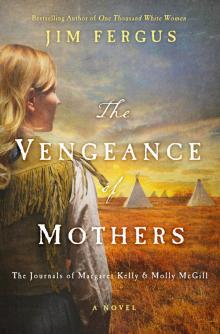 La Vengeance des mères
La Vengeance des mères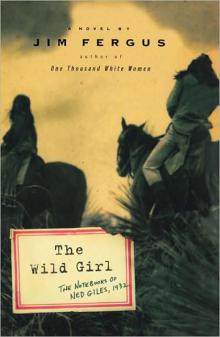 The Wild Girl: The Notebooks of Ned Giles, 1932
The Wild Girl: The Notebooks of Ned Giles, 1932 One Thousand White Women
One Thousand White Women One Thousand White Women: The Journals of May Dodd
One Thousand White Women: The Journals of May Dodd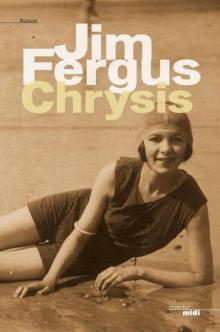 Chrysis
Chrysis Strongheart: The Lost Journals of May Dodd and Molly McGill
Strongheart: The Lost Journals of May Dodd and Molly McGill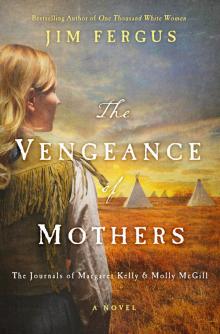 The Vengeance of Mothers
The Vengeance of Mothers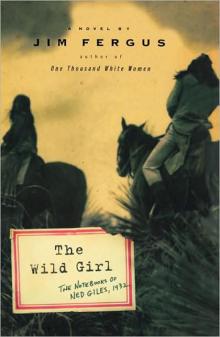 The Wild Girl
The Wild Girl